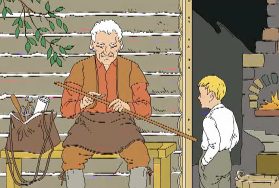修補(bǔ)匠種樹
EDWARD W. FRENTZ
愛德華·W·弗朗茲
Trees are the oldest living things in the world! Today there are growing in our country trees that were here when Columbus came to our land. Some of them were here even hundreds of years before he came.
樹是世界上最古老的生物!現(xiàn)在我們國家還生長著哥倫比亞來這里時(shí)的樹。它們中有些在他來之前就已經(jīng)存在幾百年了。
"Only God makes trees, but sometimes we can help Him," said the Tinker in his story.
“只有上帝能種樹,但我們有時(shí)可以幫助他。”修補(bǔ)匠在他的故事中說。
One day, when my Grandfather Gifford was about seven years old, he looked across the road to his father's blacksmith shop. He saw someone sitting on the bench by the door and went over to find out who it was.
我的祖父吉福德大約七歲的時(shí)候,有一天,他看向路對面他父親的鐵匠店。他看見有人坐在門口的長凳上,于是走過去看看他是誰。
There he saw a little old man, with thick, bushy eyebrows and bright blue eyes. At the old man's side was an open bag, in which grandfather could see some tools and sheets of tin. The man was a traveling tinker, who came once or twice a year to mend leaky pans and pails.
在那里,他看到了一個(gè)長著濃密眉毛和明亮藍(lán)眼睛的小老頭。老人旁邊有一個(gè)打開的袋子,祖父可以看到里面的一些工具和鐵皮。這個(gè)人是位流浪修補(bǔ)匠,每年來一兩次修補(bǔ)漏水的鍋桶。

The old man was eating his lunch, a slice or two of bread, a bit of cold meat, and a cold potato. It seemed so poor a lunch, that grandfather went to the house and brought two big apples from the cellar. The old man thanked him and ate the apples. Then he got up, and went down to the brook for a drink of water. In a few minutes he came back and sat down on the bench near the door.
老人正在吃午飯,有一兩片面包,一點(diǎn)兒冷肉和一顆冷土豆。午飯似乎很糟糕,于是祖父進(jìn)屋從地窖里拿了兩個(gè)大蘋果給他。老人向祖父道了謝,把蘋果吃了。然后他起身去小溪旁喝水。幾分鐘后,他回來了,在門邊的長凳上坐了下來。
"Now, my boy," he said, "we will make a tree grow down by the brook. There should be one, for shade."
“現(xiàn)在,小男孩,”他說,“我們要在小溪邊種棵樹。這里應(yīng)該有棵樹遮涼。”
"Make a tree!" cried grandfather. "How can we make a tree? I thought only God made trees."
“種樹!”祖父叫道,“我們怎么種樹?我以為只有上帝能種樹。”
"True," said the old man. "Only God makes trees, but sometimes we can help Him."
“沒錯(cuò),只有上帝能種樹,但我們有時(shí)可以幫他。”老人說。
With these words, he took from the bench at his side a stick that he had cut somewhere and had been using for a cane. It was slender and straight, and its smooth bark was a beautiful light-green color.
說完這些話后,他從身邊的長凳上拿起一根他從某地砍得樹枝,他一直用它當(dāng)手杖來著。它又細(xì)又直,光滑的樹皮泛著美麗的淡綠色。
"From this," said the tinker, "we will make a tree in which the birds shall build their nests. Under it the animals shall find shelter from the hot sun. But first let us make some music. Take this stick down to the brook, and dip it in the water."
修補(bǔ)匠說:“我們將用它造棵樹出來,鳥兒們將在它上面筑巢。在樹下,動(dòng)物們將在火熱的太陽下找到遮蔽處。但是先讓我們制造一些音樂。拿著這根樹枝到小溪邊,把它浸在水里。”
My grandfather took the stick and did as the old man had told him. When he came back, the tinker had a large knife open in his hand. With it he made a cut through the bark of the stick, about a foot from one end. By holding the knife still, and turning the stick slowly toward him in his fingers, he cut the bark all the way round.
我的祖父拿著樹枝按照老人的話做了。他回來時(shí),修補(bǔ)匠手里拿著一把大刀。他用刀在離樹皮一端一英尺的位置切了一個(gè)口子。他拿著刀不動(dòng),用手指緩慢地朝自己轉(zhuǎn)著樹枝,把樹皮從頭到尾切開。
Then he cut a big notch, near the end of the stick and farther down, he made four or five smaller notches. Last of all, he laid the stick across his knee, and turning it slowly, began to tap it gently with the handle of the knife.
然后他在靠近樹枝末端處切了一個(gè)大凹口,往下又切了四、五個(gè)小凹口。最后,他把樹枝橫放在膝蓋上,慢慢地轉(zhuǎn)動(dòng),開始用刀柄輕輕地拍它。












